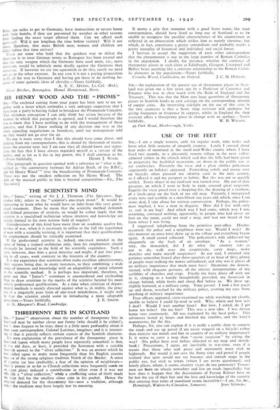USE OF THE FEET
am a single woman, unfit for regular work, who walks and loves what little remains of unspoilt country. Lately I crossed about four miles of moorland in the small mid-Wales county where I have lived two months, to a pleasantly remote village in the next valley; admired tablets in the church which said that the hills had been given in perpetuity for healthful recreation; sat down in the public eye to eat sandwiches. Presently the vicar and a plain clothes policeman (apparently on holiday) appeared. Painstaking yokels and young men on bicycles often perused my identity card in the next county, so I offered it and my passport as before. But this was not so quickly settled. Every object in my rucksack was turned over. My out-of-date passport, on which I went to Italy in 1926, aroused great suspicion. Eagerly the vicar pored over a shopping-list, the drawing of a rainbow, of a larch-spray on the back of my old map. Patiently I interpreted every note and scribble in a sketchbook ten years old, which, since I am stone deaf, I take about for written conversation. Perhaps, the police- man implied, I was a man in disguise. How did I live with only is. sod. in my bag? And which way I had come, which way I was returning, conveyed nothing, apparently, to people who had never set foot on the moor, could not read a map, and had not heard of the farm where I was living.
I suggested telephoning from the primitive post-office. Hitches occurred; the police and a neighbour were out. Would I wait? At this moment an army lorry drew up in the village and everything began again. A small crowd collected. The policeman's wife addressed me eloquently on the back of an envelope. " As a woman," why, she demanded, did I do what the country asks us not to do, walk over the countryside, carry maps, make sketches and make myself suspicious? At our end, I retorted (my patience somewhat frayed after three-quarters of an hour of this), plenty of people were walking the moors unhindered, and why was it places of no military importance that made most fuss? Meantime she demon- strated, with eloquent gestures, all the sinister interpretations of my scribbles of churches and crags. Finally the lorry drove off with me in it, clinging to a handle thoughtfully provided, my haversack in charge behind, while fowls and sheep fled before us. We drew up, slightly battered, at a military camp. Time passed. I took a few paces up and down, watched by the military police, averting my eyes from anything of military importance.
Four officers appeared, cross-examined me while watching me closely, unable to believe I could lip-read so well. Why, where and how was I deaf? Would I wait another hour? But how, I asked, do I get home ten miles? On my feet? This was a new idea. I was driven home very courteously. All was explained by the local police. This adventure lasted 2 hours and finished my rambles, and the lorry's manoeuvres, for the day.
Perhaps, Sir, you can explain if it is really a public duty to congest the roads and use up petrol (I am never stopped on a bicycle) rather than exercise our minds and feet in country of no military importance? Is it worse to carry a map than " excite suspicion " by asking the way? (No police have ever before objected to my map and sketch- book.) Precautions, I agree, are inevitable in war-time, even if it means that those who seek peace and anonymity must stick to highroads. But would it not save the Army time and petrol if people realised that spies would not eat bananas and consult maps in the public eye, but stick to towns (where I am never questioned) and lonely places, where, it seems, country vicars do not penetrate? Towns- men are born on wheels nowadays and live on roads (mercifully) but how does it happen that the descendants of Parson Kilvert have so far lost the use of their feet and the love and knowledge of the country that crossing four miles of moorland seems incredible?—I am, Sir, &c.,
Holmfeigh, Walton-by-Clevedon, Somerset. JOAN STURGEo.


























 Previous page
Previous page